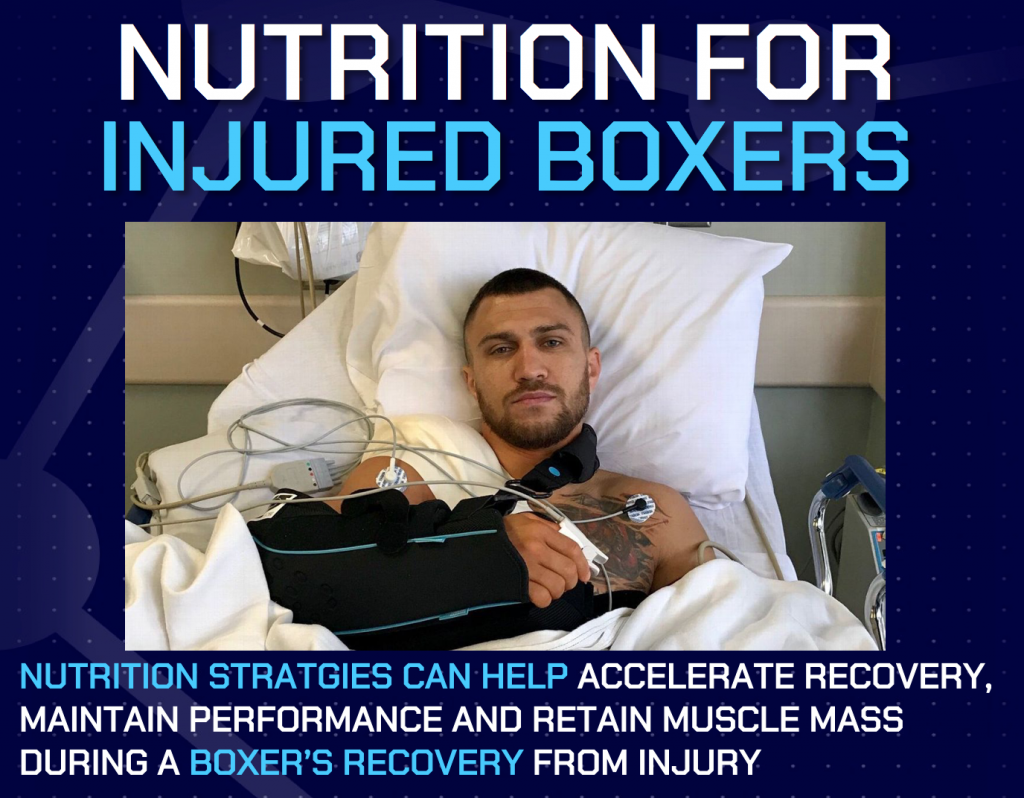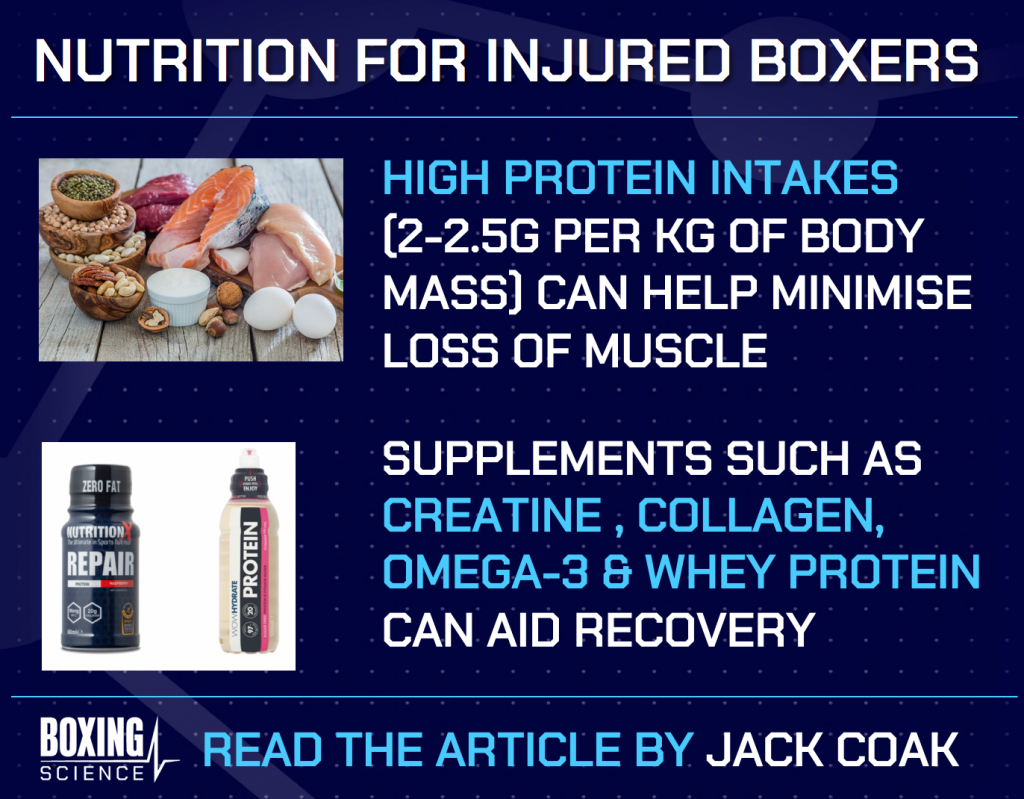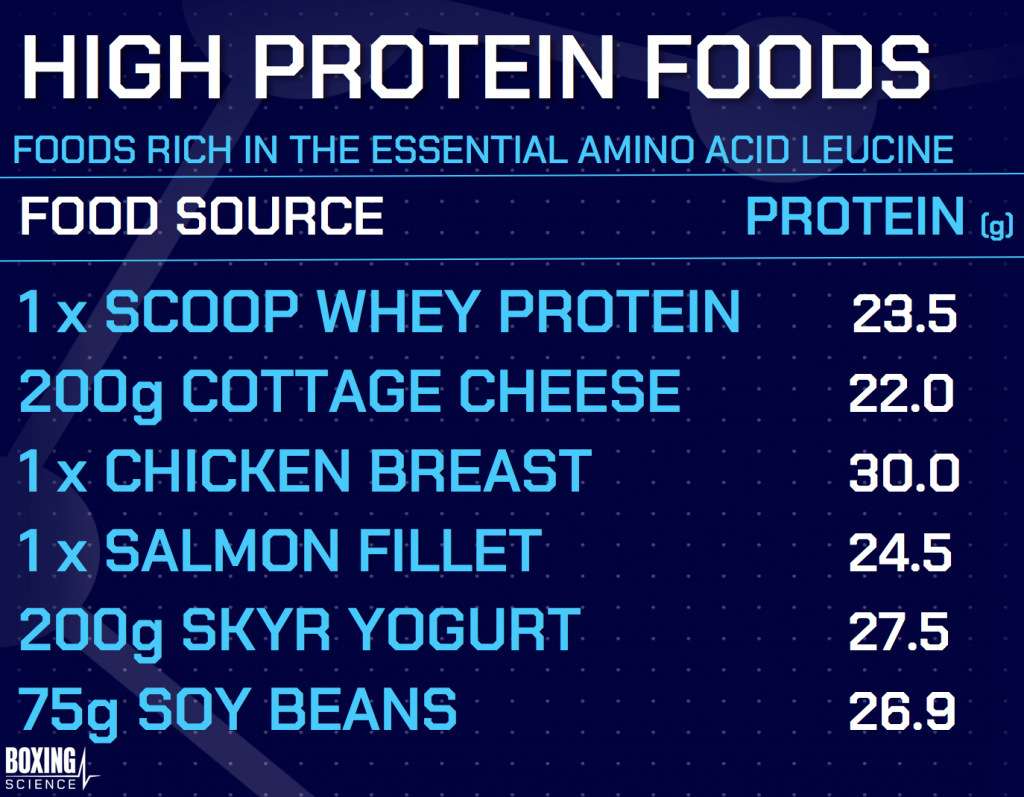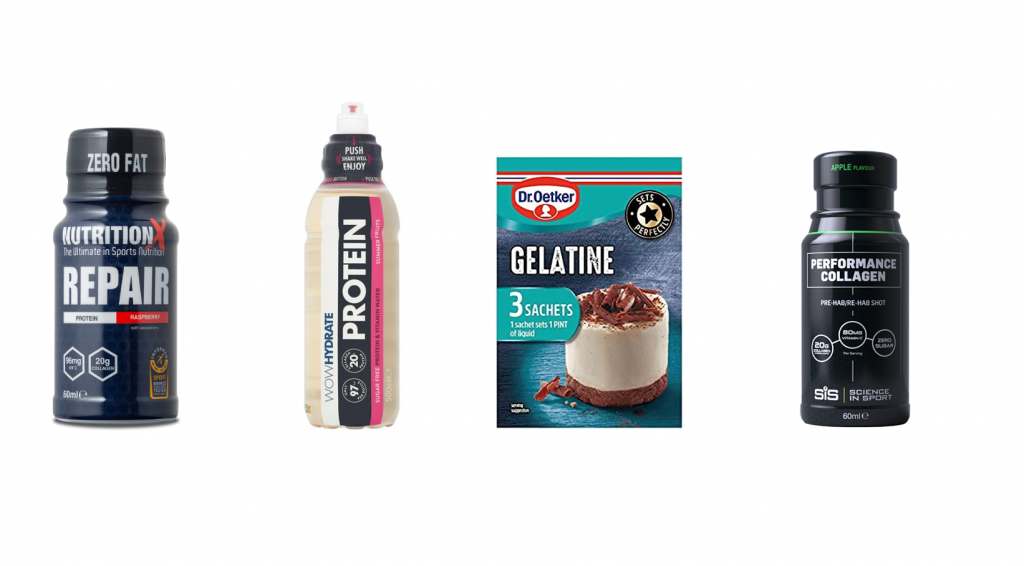Nutrition For Injured Boxers
Do you want to know how nutrition can help you recover faster from an injury?
This article will explain how different nutrition strategies can help support a boxer’s recovery from injury & what supplements can help accelerate a boxer’s return to the ring.

Quick Summary
- Nutrition can play a key role in a boxer’s injury rehab programme
- Boxers should focus on maintaining energy balance whilst injured
- Daily protein intakes of 2-2.5g per kg body mass will help to minimise muscle mass losses during immobilisation
- Periodising carbohydrate intakes around exercise & in the morning will help minimise unwanted gains in body fat
- Supplements such as creatine, omega-3 & whey protein may help injury recovery
- Collagen protein paired with vitamin C can help boxers recover faster from tendon, ligament & joint injuries

WRITTEN BY PERFORMANCE NUTRITIONIST JACK COAK (MSC, SENR)
Unfortunately injuries are a common occurrence across most sports, particularly in boxing due to the intense training regimes boxers complete. Being injured can have several effects on a boxer’s life, such as stopping them from being able to train at full or indeed any capacity.
Partial or complete immobilisation can lead to reductions in physical activity levels which can have an immediate impact on a boxer’s body composition. The two key areas of concern are increases in fat mass & losses in muscle mass with the latter typically more common to occur when upper & lower limbs are injured.
Most injured boxers will undergo some form of injury rehabilitation to aid their return to training, however a well planned nutrition strategy can also play a key role in accelerating a boxer’s return to training & help to reduce any negative effects on body composition. Below I provide 5 nutrition tips for any boxers who are going through an injury rehabilitation phase.
Consume A High Protein Diet
Following an injury, I would recommend boxers to consume a high protein diet to help minimise any losses in muscle mass. An intake of around 2-2.5g per kg of body weight or of lean mass (if body composition data has been collected) is a good target for boxers to aim for – that’s 150g/day for a 70-75kg fighter. Protein sources should contain a high leucine content (around 2.5-3g) which is the key amino acid which triggers muscle protein synthesis.
Consuming high quality leucine rich proteins every 2-3 hours throughout the day will help to minimise muscle mass losses – for reference try to consume 20-30g of protein with every meal & snack.

Maintain Energy Availability
The intake of energy i.e. food, is the key player in any injury rehabilitation nutrition strategy. Most boxers would think it’s best to reduce their energy intake to place themselves into an energy deficit to ensure they don’t put any any unwanted fat mass whilst they are injured.
However research has shown that during the rehab process following an injury, energy expenditure can increase by 15-50% depending on the injury sustained (for example using crutches requires a high energy output)
It is therefore crucial that boxers match their energy expenditure with an appropriate energy intake to help maintain energy balance. It is a tough balancing act, but an optimal state of energy availability will help support the healing process & of course prevent any increases in fat mass.
Remember, the healing process following an injury requires energy!
Appropriate Supplementation
Several supplements can help aid the recovery process following an injury by helping to reduce any losses in muscle mass & aiding recovery from traumatic brain injuries (concussion).
Creatine monohydrate supplementation immediately following injury may help counter muscle mass losses during periods of immobilisation & support brain health following a traumatic brain injury. An acute loading phase of 10g per day for 2 weeks followed by a maintenance dose of 3g per day is recommended.
Whey protein is another useful supplement for boxers to utilise during this phase to help reduce losses in muscle mass. 1 scoop (25g) of high quality (batch tested) whey protein contains 3g of leucine, which as previously mentioned is the key player in the stimulation of muscle protein synthesis. Boxers may wish to incorporate a whey protein supplement into their daily diet if they struggle to hit their daily protein intake whilst they are injured.
Omega-3 fatty acids in the form of a high dose omega-3 fish oil (EPA intake of 2g/day) may help reduce inflammation during the injury healing process. Boxers should focus on consuming fresh water oily fish such as salmon or mackerel, several times a week during their recovery phase, however for those who don’t like eating fish, supplementation of Omega-3’s may provide beneficial.
Periodising Carbohydrate Intakes
As physical activity levels & therefore rates of energy expenditure will likely decrease following an injury, the requirement for carbohydrates will reduce significantly. However this does not mean that carbohydrates should be excluded from the diet, instead they should be reduced which will in turn allow for an increase in protein intake. Boxers can benefit from consuming low glycemic index carbohydrates whilst they are recovering from injury such as:
- Quinoa
- Cous Cous
- Brown Rice
- Sweet Potato
- Oats
It may also be beneficial for boxers to consume their carbohydrates earlier in the day such as with breakfast & around light training sessions (if they are able to exercise) in order to reduce gains in body fat which is associated with late night carbohydrate consumption.
Collagen For Tendon/Joint Injuries
Collagen is the new kid on the block in the injury recovery/prevention scene. Tendon & ligament injuries are very common amongst boxers paticulary in the shoulder complex. Novel research has shown that collagen protein can help speed up recovery times from tendon, joint & ligament based injuries.
Collagen is the most abundant protein in the body & is a key building block in bone & connective tissue (tendon) formation. Consuming 10-15g of collagen protein with around 50-100mg of vitamin c daily or 30-45 minutes before exercise can help enhance collagen synthesis.
This can be achieved by consuming collagen in the form of food sources such as gelatine which can be used to make desert options such as mousse & fruit jellies or by consuming collagen/repair shots.
Check out some easy collagen options available on the market below:
NOTE: IF YOU’RE A COMPETITIVE ATHLETE MAKE SURE THAT ANY SUPPLEMENT USE MUST BE BATCH TESTED AND APPROVED BY INFORMED SPORT

Summary
- Nutrition can play a key role in a boxer’s injury rehab programme
- Boxers should focus on maintaining energy balance whilst injured
- Daily protein intakes of 2-2.5g per kg body mass will help to minimise muscle mass losses during immobilisation
- Periodising carbohydrate intakes around exercise & in the morning will help minimise unwanted gains in body fat
- Supplements such as creatine, omega-3 & whey protein may help injury recovery
- Collagen protein paired with vitamin C can help boxers recover faster from tendon, ligament & joint injuries
-
 Train Like A Champion – NUTRITION Handbook£80.00
Train Like A Champion – NUTRITION Handbook£80.00 -
 PUNCH HARDER – FREE E-BOOK BY BOXING SCIENCE£0.00
PUNCH HARDER – FREE E-BOOK BY BOXING SCIENCE£0.00 -
 Boxing Science Membership£8.99 / month
Boxing Science Membership£8.99 / month
